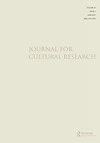Lost items and exposed shame – dreamcore’s inheritance and transcendence of liminal space and defamiliarization
IF 0.6
Q1 CULTURAL STUDIES
引用次数: 0
Abstract
ABSTRACT Dreamcore originates from a video (or image) form submitted on 21 April 2018, when an anonymous user posted a thread on 4chan’s paranormal section collecting images that would make people feel ‘uncomfortable', and another user’s comment under it gained the attention of the community. And it has been a new subculture that uses familiar scenes to make the audience nostalgic but uneasy, with two important characteristics: ‘Lost items’ and ‘exposed shame’. In contrast to the philosophical concept ‘sense of material’, the absolutely independent defamiliarization, or liminal space’s ‘neither … nor … ’, ‘lost items’ pursues the familiarity in strangeness without resorting to the expression of magical reality, or using ambiguity between the two to create a ‘either … or …’ atmosphere; Compared with modern urban planning based on the principle of ‘ecology’, ‘exposed shame’ reveals infrastructures that do not match the natural setting in the image, causing abruptness and embarrassment. Both point to the dreamcore’s playful ambiguity, thus not being governed by serious art and symbolising the original intention of free creation.遗失的物品与暴露的羞耻——梦核对阈限空间与陌生化的继承与超越
Dreamcore源于2018年4月21日提交的一份视频(或图像)表格,当时一名匿名用户在4chan的超自然区域发布了一个帖子,收集让人感到“不舒服”的图像,另一名用户在该帖子下的评论引起了社区的关注。它是一种新的亚文化,用熟悉的场景让观众怀旧但不安,有两个重要特征:“失物”和“暴露的羞耻”。相对于哲学概念“物质感”、绝对独立的陌生化,或阈域空间的“既非……也非……”,“失物”在陌生中追求熟悉,而不诉诸魔幻现实的表达,也不利用两者之间的模糊性来营造“非此即彼”的氛围;与基于“生态”原则的现代城市规划相比,“暴露的耻辱”揭示了图像中与自然环境不匹配的基础设施,造成了突兀和尴尬。两者都指向了梦核游戏的模糊性,因此不受严肃艺术的支配,象征着自由创作的初衷。
本文章由计算机程序翻译,如有差异,请以英文原文为准。
求助全文
约1分钟内获得全文
求助全文
来源期刊

Journal for Cultural Research
CULTURAL STUDIES-
CiteScore
1.40
自引率
0.00%
发文量
23
期刊介绍:
JouJournal for Cultural Research is an international journal, based in Lancaster University"s Institute for Cultural Research. It is interested in essays concerned with the conjuncture between culture and the many domains and practices in relation to which it is usually defined, including, for example, media, politics, technology, economics, society, art and the sacred. Culture is no longer, if it ever was, singular. It denotes a shifting multiplicity of signifying practices and value systems that provide a potentially infinite resource of academic critique, investigation and ethnographic or market research into cultural difference, cultural autonomy, cultural emancipation and the cultural aspects of power.
 求助内容:
求助内容: 应助结果提醒方式:
应助结果提醒方式:


